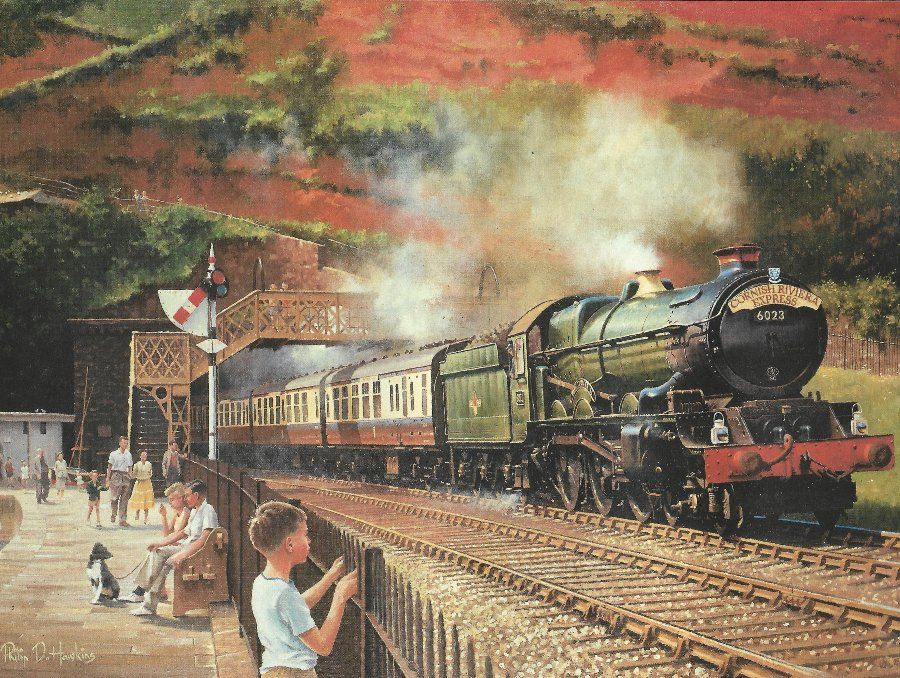Living in Ireland now, but used to live in Exeter, and have fond memories of happy hours watching GWR and Southern steam at Exeter St Davids. Hightlights of the day were things like the down Cornish Riviera Express, with a King on the front, coming through the centre road at speed non stop, and the regular bankers that were essential to get the Southern trains up to Central. Even a relatively light passenger train got help, and the other highlight was the daily ballast train from Meldon, there was a specific banker engine fleet, the Z class, and for the ballast, they'd send 3 down, put 2 on the back, and a third Z on the front to help the engine that had brought the train in from Meldon, usually a Lord Nelson class. Once they were all set up, it was then a case of a time delay to let everyone get their safety's lifting, then a cacophony of whistles as the front got the all clear, and sounded off to let the rest know it was time to go, followed by the responses from the 2 on back, and then the fun started, especially on a wet day, they needed the power of all 4 engines to get up that slope.
Another bit of "fun" was getting to know some of the drivers of the 14xx class that were used on the Exe Valley line, and then being able to grab a ride from the southern end of Platform 5 out to beyond the cross overs, and back onto the bay platform 1 to couple up to the trailer coaches that were still in use on that line.
I was still young enough to get child rate rover tickets, and in those days, it was possible to go as far as Lyme Regis in the east, and down to Plymouth on both the GWR and Southern, and up the Exe valley to Dulverton, and all of them were still steam, though it wasn't long before the GWR became diesel multiples, and most of the Southern branch lines were killed off, There were other places on that rover, but the "nice" runs were the branch lines. I can't remember every going up to Hemyock from Tiverton Junction, I think the passenger service had finished when I was roving.
The return of the Okehampton section will be very much welcomed by the people of North Devon, and maybe, with luck, the hoped for plan to reopen through to Plymouth will become a reality, and make it possible to have an alternative to the South Devon coast section, which is still very vulnerable to sea erosion, despite massive expenditure in recent years.
Did Beeching get it right? In some respects maybe, but the solution would have been less painful if the move to diesel and electric services had happened sooner, we all know that the running costs of steam were massive, and the parcel systems of the day meant long lay over times in each station, which is now very much not the case.
As to what may get put back again in some form as a result of the changes to reduce carbon footprint, who knows? It may well be the case that some routes could be rebuilt, at least partially, and if a way to mix rail and road to handle some types of freight were to happen, the reduction in carbon footprint could be massive, I for one would be very happy to see a massive reduction in the number of HGV's on the roads, and with some sensible choices, that should be possible.
As for what will happen to steam, I suspect that's going to be a very interesing fight, the heritage railway routes will fight long and hard to retain their locomotives, and even the old diesels are going to be looked at very seriously, given their ability to spew massive clouds of exhaust smoke, some of them could be mistaken for steam given the clouds they emit,especially when cold.
I doubt I'll see the end of those fights, it will probably rumble on for 20 or 30 years, and even then there will be plenty of people who will not want the history of the country to be destroyed to the degree that the greens will be happy with, and at over 70 now, I suspect it will become an issue of considerable indifference for me over the next decade, as long as I can still get some sort of suitable fuel to run the O gauge steamers that I have. 
 Bazyle.
Bazyle.




